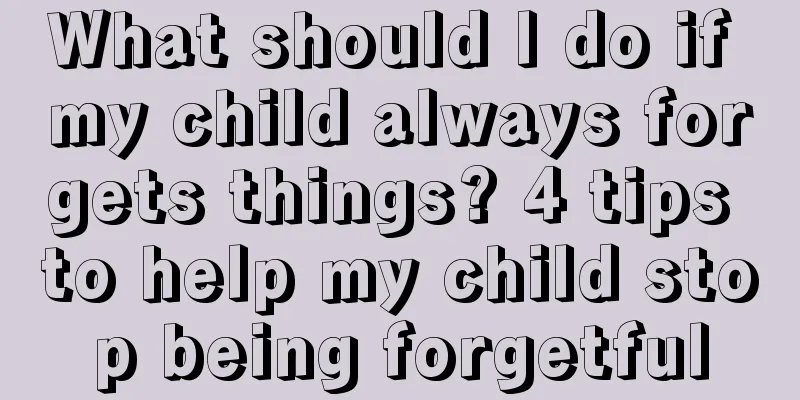When will a newborn baby stop spitting up milk? What should I do if my baby spits up milk?

|
Many babies will spit up milk. So, when will newborns stop spitting up milk? When does a newborn stop spitting up milk?To understand this problem, we must first understand why the baby spit up. In fact, the main reason for newborn spit up is that the stomach actually has two doors. One is the cardia connected to the esophagus, which is the entrance of our stomach, and the other is the pylorus connected to the intestine, which is the exit of the stomach. The cardia of infants and young children is relatively loose and cannot be closed tightly. Therefore, when food is excessive, it is easy to cause food reflux and break out of the door, resulting in vomiting. However, when the child is older, around six months old, the cardia develops gradually and the stomach's digestive system becomes more mature, so the spitting up will naturally improve. But everyone's situation is different. If the baby is still spitting up at 8 months old, parents can take the baby for a check-up. Ways to improve baby's spitting up1. Burping After the baby drinks milk, the lower part of the stomach is filled with milk and the upper part is filled with air, which will cause stomach pressure and cause milk overflow and vomiting. Therefore, you should help the baby burp in time to let the gas out. As long as the pressure in the stomach is reduced, vomiting and milk overflow can be reduced naturally. 2. Postural therapy If burping is difficult, hold your baby upright and let him lie on your shoulder for at least 30 minutes. Then raise the pillow and let your baby lie on his right side. This can effectively increase the speed of stomach emptying. 3. Diet therapy Increase the number of feedings, reduce the amount of milk each time, and feed small and frequent meals. Hold the baby for a while after feeding, and don't rush to lay him flat in the crib. This will help reduce reflux. However, milk that is too thick can easily cause gastrointestinal obstruction or diarrhea. Drug treatment If the vomiting and regurgitation are serious, ask the doctor to prescribe some drugs to stimulate gastrointestinal motility to improve the condition. However, drug treatment should be considered last. What to do if your baby spits up1. Keep your upper body elevated Once vomitus enters the trachea, it will cause suffocation. Therefore, when letting the child lie down, it is best to put a bath towel under the child's body and keep the upper body elevated. If the child vomits while lying down, we can turn the child's face to one side. 2. After spitting up, pay more attention to the child's condition When the child is lying down, you should raise the child's head, or simply hold the child upright. After spitting up milk, the child's face may not look good, but it is okay as long as he recovers later. In addition, you can give the child some water according to the situation. 3. Rehydrate within 30 minutes after vomiting If you give your child water right after he or she spits up, it may cause him or her to vomit again. Therefore, it is best to try to give your child some water a little at a time with a spoon about 30 minutes after he or she spits up. 4. After spitting up, the amount of milk you feed each time should be reduced to half of the usual amount. When the baby recovers and wants to breastfeed again, we can feed the baby some more milk. But the amount of milk each time should be reduced to about half of the usual amount, but the number of feedings can be increased. During the period of continuous vomiting, we can only feed the baby milk, and not other foods, including complementary foods. What to do if the baby chokes on the trachea due to vomiting milkWhen a child spits up milk, the first thing to do is to let the child lie on his side, preferably on the right side. If necessary, you can also hold the child's feet and lift the child upside down to prevent the milk from choking into the trachea, which can cause aspiration pneumonia or even suffocation. If the child spits up milk and milk flows out of the nose, just clean it up. The nasal cavity will slowly turn into dry scabs and be removed. If the child continues to choke and cough after vomiting milk, it is considered that there is milk in the trachea and it is recommended to seek medical attention immediately. Another thing to be reminded of is: If the child is fed with milk powder, the water temperature should be adjusted first and then the milk powder should be added; some parents are afraid that their children will choke when sucking on the nipple, so they will lay the bottle flat to control the flow, but they don't realize that this can easily cause the child to swallow a lot of air. Generally speaking, there are two reasons why babies spit up: being sick or eating too much. If the baby does not show any uncomfortable expression or crying on his face after spitting up, it means that he has eaten too much or the feeding posture is incorrect. However, once the baby shows an uncomfortable expression, you should check what is wrong with the baby. Tips for dealing with baby spitting up1. Burping method. Babies should be held upright after three months. After feeding, mothers should hold the baby upright, let the baby's head rest on your shoulder, and gently pat the baby's back. After the baby burps, keep this position for a while and then put the baby down. This can effectively expel the air in the baby's stomach. Then let the baby lie down, and the baby's spitting up will be greatly relieved, and may even prevent spitting up. 2. Eat small and often. Because mothers don’t really understand how much the baby should eat, and how much the baby needs to eat to feel full, and because babies are in a hurry to breastfeed, it is easy for them to inhale more air at this time. Therefore, it is recommended that mothers eat small and often, reduce the amount of each feeding, and increase the number of feedings. If the baby does not cry, don’t worry too much, it means he is not hungry. |
>>: Does increased leucorrhea mean pregnancy? What is the cause of increased leucorrhea?
Recommend
Is IVF healthy? What harm does IVF have on pregnant women?
The laughter of children is a very important part...
How to prepare the dipping sauce for boiled shrimp How to make boiled shrimp for babies
Boiled shrimp is a kind of shrimp cooked in boili...
How to protect children from the sun when taking them to the beach? Which sunscreen is best for children to take to the beach?
When summer comes, going to the beach to surf is ...
Will eating garlic sprouts reduce milk production? Can I eat garlic sprouts during breastfeeding?
Breastfeeding mothers should pay special attentio...
Why does the baby cry without tears? Is it normal?
Have you noticed that newborn babies have no tear...
9-month-old baby development standard 9-month-old baby development index
At the age of nine months, the baby already has h...
What kind of pillow core is good for children's pillows? Children's pillows should not be too hard
Choosing a good pillow for your baby also plays a...
What brand is Catherine Cottage? Which country is Catherine Cottage from?
Catherine Cottage is a Japanese brand of children...
What does it feel like for a pregnant woman to have her cervix opened? When is the best time to have her cervix opened?
The baby needs to pass through the cervix to come...
What kind of bird's nest is good for pregnant women? Where can I buy authentic bird's nest?
As people pursue a better quality of life, women ...
What are the effects of a baby grinding his teeth while sleeping? 5 effects to pay attention to
Many babies will show symptoms of teeth grinding ...
How to effectively increase milk production? Breastfeeding is the key
Mothers with insufficient milk always try to find...
What factors affect children's IQ? It turns out that the most important factor affecting IQ is
In the eyes of many people, children's IQ can...
What to do if your baby is picky about food? A complete solution for your baby's picky eating
Babies' partial eclipse is the most troubleso...
How to clean a bath towel if it has a peculiar smell? Is it hygienic to wash the bath towel in a washing machine?
Maybe it's because the weather has not been v...









